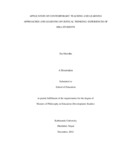
Please use this identifier to cite or link to this item:
https://hdl.handle.net/20.500.14301/206| Title: | APPLICATION OF CONTEMPORARY TEACHING AND LEARNING APPROACHES AND LEARNING OF CRITICAL THINKING: EXPERIENCES OF MBA STUDENTS |
| Authors: | Shrestha, Era |
| Citation: | Shrestha, E.(2012).Application of contemporary teaching and learning approaches and learning of critical thinking: Experiences of MBA student |
| Issue Date: | Dec-2012 |
| School: | SOED |
| Department: | DODE |
| Level: | Masters |
| Program: | KUMSD |
| Abstract: | Critical thinking is a very crucial life skill. Educational institutions have very important responsibility for empowering students with critical thinking competencies. However, students graduating from Nepali educational institutions are considered to lack critical thinking competencies, because of the traditional, teacher centered approaches. Masters in Business Administration (MBA) are promoting student centered, contemporary teaching and learning approaches in Nepal. Research and studies have established that such approaches promote critical thinking. Therefore, this research was undertaken with the interest to understand how our educational system is transforming because of the application of contemporary teaching and learning approaches. This study explored the students’ perception of their MBA course, where they have the opportunity to experience contemporary teaching and learning approaches. Their experiences of the various learning processes, learning behavior, orientations, and strategies were explored ii to understand the implication of contemporary approaches in the learning of critical thinking. The findings of the study indicated an emerging transition from a ‘teacher centered approach’ towards a ‘students centered approach’. The learning processes are transforming from traditional, theory based, book centered, and lecture focused approaches to more interactive, engaging, and participative approaches. The transformation has promoted an enabling environment that facilitates active exploration, questioning, articulation (of ideas/opinions), interaction, and justification. This has created potential opportunities for students to engage in critical thinking. However, the available opportunities have not been realized by the students to actually practice critical thinking because of the lack of metacognitive and metastrategic competencies and evaluative epistemology. Students are not able to engage in the process of ‘critical dialogue’ that entails reflection, questioning (challenging), and argumentations without which critical thinking is not possible. Students are not conscious of their own thinking process, do not question their own belief and assumptions and cannot control and guide their thinking to practice objective evaluation and judgment. Students approach questioning with caution, view confrontation negatively, and often base their argumentation on intuition and imagination rather than evidences. They either withdraw (compromise) or rely on aggression, force, or domination to win an argument rather than objective reasoning. Two factors have contributed toward this constrains and challenges in realizing the existing potential a) limitation in application of the contemporary tools and approaches, which manifest constrains in teachers’ capacity to manage the dynamics of iii the learning processes b) students’ motives, goals and interests that influences them to accept others’ wills (of teachers/authority and co-learners) and restricts them to exercise their freedom of inquiry, evaluation, and self judgment. The study concludes that the application of the contemporary approaches has only created an enabling environment but it has not actually enabled critical thinking. Therefore, it is evident that though theoretically the contemporary teaching and learning approaches (active learning approaches) have the potential to promote critical thinking by supporting enabling processes, application of it alone will not automatically lead to end results of enabling critical thinking if the learning processes are not managed to overcome the constrains. The findings of the study have specific relevance and implication on education institutions that aims to apply contemporary approaches to promote critical thinking. From the study it is evident that critical thinking requires conscious effort and focused strategy. Hence, it cannot be achieved unless it is an explicitly stated educational goal and investment made accordingly. This commitment need to be expressed in form of an institutional policy and accordingly changes affected on various fronts such as instructional strategies, teachers’ capacity, students and teachers’ selection, incentive mechanism, and assessment methodologies. |
| URI: | https://hdl.handle.net/20.500.14301/206 |
| Appears in Collections: | Research Project |
Files in This Item:
| File | Description | Size | Format | |
|---|---|---|---|---|
| ERA SHRESTHA - Final Thesis for Binding (Dev Studies 2012).pdf | 966.44 kB | Adobe PDF |  View/Open |
Items in DSpace are protected by copyright, with all rights reserved, unless otherwise indicated.